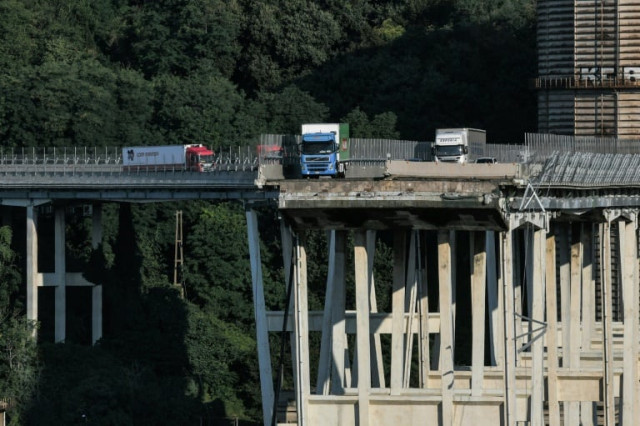Italian bridge company under fire as rescuers toil for third day
Italy is set to receive around 2.5 billion euros of European funds for investments in network infrastructure

PHOTO AFP
Anger is mounting over the tragedy and the structural problems that have dogged the decades-old Morandi bridge, which buckled without warning on Tuesday, sending about 35 cars and several trucks plunging 45 metres (150 feet) onto railway tracks below along with huge chunks of concrete.
The government has accused infrastructure giant Autostrade per L'Italia of failing to invest in sufficient maintenance — a claim the company denies — and said it would seek to revoke its lucrative contracts.
Shares in Atlantia, the holding company of Autostrade, slumped 22 per cent by Thursday in the wake of the barrage of criticism.
Interior Minister Matteo Salvini demanded that the company offer up to 500 million euros ($570 million) to help families and local government deal with the aftermath of the disaster.
Search for survivors after Italian motorway collapse kills at least 26
"If we've put up five million euros, they should offer 500 million," he told reporters.
"There needs to be an immediate, concrete and tangible signal for these families: they should put their hands on their hearts and in their wallets."
The collapse has prompted fears over other ageing infrastructure in Italy and abroad, with Bulgaria announcing Thursday a plan to renovate more than 200 bridges while France has said one in three of national road bridges are in need of repair.
With Genoa's chief prosecutor saying that between 10 and 20 people could still be missing under the huge piles of concrete, rescue workers clambered across the rubble hoping to find survivors.
Fire official Emanuele Gissi said the unstable mountains of debris made the search operation dangerous.
"We are still looking for cavities that can hide people, living or not," he said, adding that the round the clock search had failed to find any more victims overnight.
Cranes and bulldozers worked to help clear the site as rescuers try to cut up and remove the biggest slabs of concrete.
National anger grows as Italy bridge collapse kills 37
At least 38 people were killed, according to an update by Prime Minister Giuseppe Conte Thursday.
The dead include children aged eight, 12 and 13, according to Salvini, while three Chileans and four French nationals are among those killed. Sixteen people were injured.
But some incredible stories of survival have emerged since the disaster.
Marina Guagliata and her 24-year-old daughter were in a shop under the bridge when huge chunks of concrete smashed through the building.
"I was buried up to my chest, and my daughter was completely buried," said Guagliata, 58, who appeared on Italian television with her head bandaged.
Her daughter Camilla remains in hospital with a crushed leg and fractures to her pelvis, ribs and an arm, as well as a punctured lung.
Genoa's Morandi viaduct was completed in 1967 and has been riddled with structural problems for decades, leading to expensive maintenance and severe criticism from engineering experts.
Its collapse prompted the government to announce a year-long state of emergency in the region and day of mourning Saturday.
Italy's football association said Thursday it had agreed to postpone Serie A games involving Sampdoria and Genoa this weekend as a sign of respect.
The government, in power since June, has pinned the blame on Autostrade, which operates and maintains nearly half Italy's motorways.
Autostrade, which estimates it will take five months to rebuild the bridge, denies scrimping on motorway maintenance, saying it has invested over one billion euros a year in "safety, maintenance and strengthening of the network" since 2012.
With pressure mounting, it released a statement Thursday saying ambulances would be able to travel on its roads toll-free from now on to "further enable the precious rescue and aid operations".
Atlantia has slammed the threats to revoke its concessions and warned that the government would have to refund the value of the contract, which runs until at least 2038.
The disaster is the latest in a string of bridge collapses in Italy, where infrastructure generally is showing the effects of a faltering economy.
Senior government figures have also lashed out at austerity measures imposed by the European Union, saying they restrict investment.
But the European Commission said it "will not engage in any political finger pointing".
It said Italy is set to receive around 2.5 billion euros of European funds for investments in network infrastructure, such as roads or rail, in the period from 2014 to 2020.
More than 600 people were evacuated from around a dozen apartments beneath the remaining shard of the bridge.
Salvini has said the buildings would have to be pulled down.
With little hope of returning home soon, many are staying with relatives, while local hotels and individuals have offered free lodging to those displaced.



















COMMENTS
Comments are moderated and generally will be posted if they are on-topic and not abusive.
For more information, please see our Comments FAQ